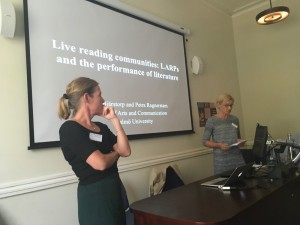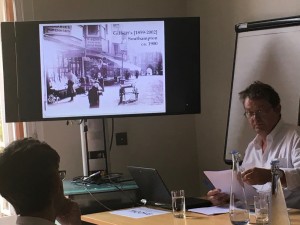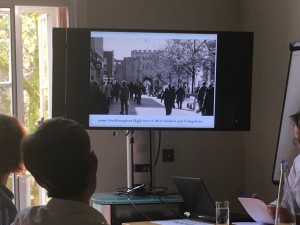Simon Frost and I recently took part in this event organised by an AHRC project based at The Open University which follows on from previous research leading to the establishment of The Reading Experience Database (RED). The event brought together book historians, literary scholars and researchers working on the borders between literature and media and cultural studies to explore a variety of examples of reading communities from Quaker reading groups and records of readers in the borrowing records of national libraries, to online book clubs and LARPs (Live Action Role Playing events). 
This was a good opportunity for us to promote the work of the BU based Digital Reading Network, and CsJCC, based in the Faculty of Media and Communication. Simon’s paper reported on the findings of his BU Fusion funded project looking at contemporary book retailing, which was conducted in collaboration with the university bookseller John Smith’s. Simon’s paper provided a fascinating comparison of the retail landscape using past and present photographs of the same Southampton street where Gilbert’s bookshop is based. He boldly proposed replacing the term literary work with ‘Net Work’ to capture the idea of the work as an event which consists of people, places and bibliographic objects. The proposal plays into wider global HE strategies to study English for its social impact.


My paper provided a comparison of two online reading communities. The first, a Jane Austen community called The Republic of Pemberley, brings together devotees of the writer who engage in scheduled Group Reads of her work, using the website to report back and share their reading with other community members. I also discussed how readers use social media platforms such as Twitter to share their reading, for example using the hashtag #mytolstory as they embarked on reading Tolstoy’s epic novel inspired by the recent BBC adaptation. My paper drew on an article Julia Round and I recently published in the journal Language and Literature on online moderators, which was one of the outputs from our AHRC funded projects, Researching Readers Online and the Digital Reading Network.
The day provided an excellent opportunity for us to expand our networks, and establish new contacts. In particular, we were very excited to connect with researchers from the University of Malmo in Sweden whose research and philosophy for teaching English in a media context is closely aligned to our work here at BU.











 Beyond Academia: Exploring Career Options for Early Career Researchers – Online Workshop
Beyond Academia: Exploring Career Options for Early Career Researchers – Online Workshop UKCGE Recognised Research Supervision Programme: Deadline Approaching
UKCGE Recognised Research Supervision Programme: Deadline Approaching SPROUT: From Sustainable Research to Sustainable Research Lives
SPROUT: From Sustainable Research to Sustainable Research Lives BRIAN upgrade and new look
BRIAN upgrade and new look Seeing the fruits of your labour in Bangladesh
Seeing the fruits of your labour in Bangladesh ECR Funding Open Call: Research Culture & Community Grant – Apply now
ECR Funding Open Call: Research Culture & Community Grant – Apply now ECR Funding Open Call: Research Culture & Community Grant – Application Deadline Friday 12 December
ECR Funding Open Call: Research Culture & Community Grant – Application Deadline Friday 12 December MSCA Postdoctoral Fellowships 2025 Call
MSCA Postdoctoral Fellowships 2025 Call ERC Advanced Grant 2025 Webinar
ERC Advanced Grant 2025 Webinar Update on UKRO services
Update on UKRO services European research project exploring use of ‘virtual twins’ to better manage metabolic associated fatty liver disease
European research project exploring use of ‘virtual twins’ to better manage metabolic associated fatty liver disease